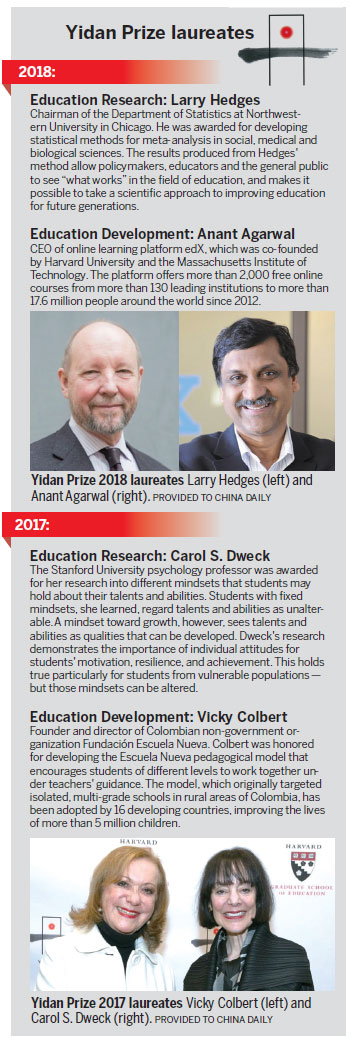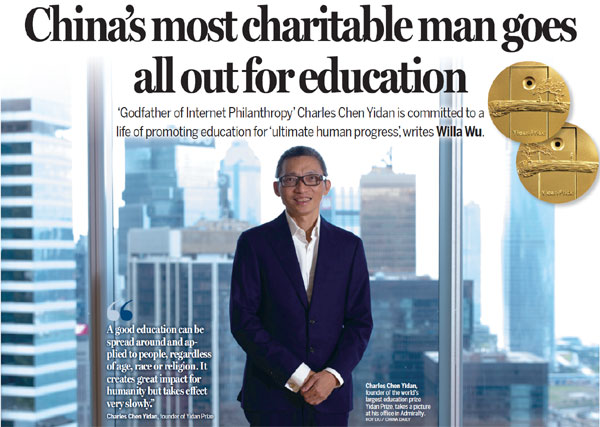China's most charitable man goes all out for education
Updated: 2018-10-26 07:03
(HK Edition)
|
|||||||
'Godfather of Internet Philanthropy' Charles Chen Yidan is committed to a life of promoting education for 'ultimate human progress', writes Willa Wu.
The world's biggest prize in education, the Yidan Prize, emerged in 2016. The annual prize, with HK$60 million ($7.75 million) split between two laureates, was all put up by one man. Charles Chen Yidan stepped into the spotlight. His name was unfamiliar to many.
Chen was co-founder of internet giant Tencent Holdings, whose market value surpassed that of Facebook last November.
Now in his late 40s, lean with gray cropped hair, the entrepreneur told China Daily "it is never enough to reward good education".
"Education is the fundamental driving force for social progress," Chen said in Mandarin, with a Cantonese accent. He was born in Huizhou city, Guangdong province, and grew up in Shenzhen.
Chen was raised by an illiterate grandmother. That's one of the reasons he places such high value on education. His grandmother never pushed him to study, nor did she hector him about the importance of education.
"But she inspired in me the joy of learning: When I finished my homework, she would give me a nod or a smile. When I was ready for school, she would give me an egg. There were a lot of small nuances between us that made me realize that my grandmother, not knowing a single written character, valued education," Chen said.
As a younger woman, his grandmother had worked to send Chen's father to university. College students were a rare species then, in the era before 1966. Chen's father was the first from his village to go to university.
"It was a silent education. It did not include complicated theories or principles. Yet it was enlightening," Chen concluded.
Knowing the importance of education doesn't lead automatically to high grades. Charles Chen did poorly on the college entrance exam and ended up studying chemistry at Shenzhen University after failing to reach the threshold of his dream major - finance.
It was while attending Shenzhen University that Chen met his wife. Three of his middle-school classmates, with whom he later co-founded Tencent, also went to that university.
Path to philanthropy
After amassing his fortune, Chen stepped down as Tencent's chief administrative officer in 2013. The low-key billionaire declared he intended to commit to a life of philanthropy, focusing on promoting the cause of education.
He'd already been doing philanthropic work, anyway. In 2007, Chen and his fellow co-founders set up the Tencent Foundation, using 20 million yuan ($2.89 million) of company profits. The first effort was linking charity projects on Tencent's social network. It became China's first non-profit charity foundation on the internet.
Chen acquired a couple of nicknames like "China's Godfather of Internet Philanthropy" and "First Philanthropist of the Internet".
"From first-hand charity experience, I realized that education belongs to humanity. A good education can be spread around and applied to people, regardless of age, race or religion. It creates great impact for humanity but takes effect very slowly," he said.
Chen began edging toward his plan to do his part to improve education around the world - an award exclusively for the educators making the greatest impact. On May 24, 2013, he wrote in his diary: "to establish a global prize that went beyond religion, race and nationality, to help people realize the universe and humanity."
Three years after Chen left Tencent, he founded the Yidan Prize. He endowed HK$2.5 billion for the prize and set its headquarters in Hong Kong.
This annual prize is comprised of two awards; one for educational research and the other for educational development. Each laureate receives a gold medal and HK$30 million, made up of a cash prize of HK$15 million and project funding of HK$15 million.
"I think the Yidan Prize stands out because it places equal emphasis on the future. It is not confined to award what contributions have been made," Chen said.
The project fund, allocated to laureates in disbursements over a three-year period, is meant to fuel additional research and development. "In this way we can enhance the awarded education achievement, increase its influence and allow more people to benefit from it," he explained.
Chen said when the idea for the prize dawned on him, he felt uneasy. "I was clueless. I had no idea how to make the prize professional, fair and qualified."
He was surprised later, when he found his goal, to "change the world by acknowledging the change makers", was acknowledged by many of the world's outstanding educators, scholars and relevant stakeholders. Some even offered to help him.
Dorothy K. Gordon, head of the judging panel for the Yidan Prize for Education Development, is one contributor. The economist and chairperson of UNESCO's Information for All Program engaged in a six-week back-and-forth discussion with the prize board before becoming a member herself.
"I particularly recognize the prize's objective," she said. "It could provide the means for people to realize their full potential. Meanwhile, I am inspired by Charles. At such a young age and with a great profit-making business at hand, he turned to work on giving back to society."
In her eyes, Chen is "humble, intelligent and open". "He thinks deeply about the problems in the world and strives to provide answers," she added.
According to Gordon, each member of the judging panel takes months to go through all the applications for the prize and come up with three top entries of their own. Then the seven-strong judging panel gathers and comes up with the final awardees - one for each prize.
The prize has drawn a vast number of applications from home and abroad. In its inaugural year of 2017, the number of entries is close to 1,000.
Education starts at home
Chen's approach to educating his son arouses public curiosity. His theory is simple: to accompany, or as he puts it, "to grow up with the children".
"I am a first-time father. I also need to learn to treat my son as a person with independent thinking. It is through the time we spend together that I learn what my son needs, and my son knows I love and respect him," Chen said.
When Chen found his son was spending more time on entertainment than on studies, he worried. He felt confronted by a dilemma - to ignore what was going on to keep the peace, or to scold the boy for neglecting studies.
Chen chose neither course. He talked with his son, shared his concerns and left the boy to make his choice.
"I asked myself then: What really matters when tackling this problem. The answer is my relationship with my son. That's something I would not jeopardize.
"My role here is not to make decisions for him. Rather, I show him I care about him; I am willing to spend time with him; and I respect him," Chen said.
He said it took a while but his son eventually managed to balance study and entertainment.
Age of reform and opening-up
Chen calls himself a witness and a beneficiary of the changes brought about by the reform and opening-up policy. The policy turned Shenzhen, the once poor fishing village, into a massive urban center; from 3 square kilometers in 1979 to 934 square kilometers today.
He said what impresses him most is the development of China's education system over the past 40 years.
"Education has evolved from something rare and out-of-reach to a necessity that's within the reach of most people in the country," he said.
Those changes started back in 1986, when China launched its nine-year compulsory education program with free education for elementary and junior high school students. Government data show the retention rate of nine-year compulsory education reached 99.9 percent last year.
In May 2018, the central government announced it would add 13 billion yuan to support compulsory and vocational education in the country's central and western regions and in poverty-stricken and rural areas.
Chen also found efforts to improve education impressive.
"The internet plays a key role. On one hand, it allows top educational resources to be shared within the country at lower cost. On the other hand, it integrates China with the rest of the world, allowing the world to understand more deeply the Chinese culture, its people and what it values," Chen added.
In 2017, Chen made it to the top of Forbes China Philanthropy List, giving away 2.3 billion yuan.
The billionaire remains humble when talking about his commitment to education, but he's ambitious for the future of his prize. He hopes the world will place a higher value on education, improve education, and discuss education.
Contact the writer at
willa@chinadailyhk.com

|
Charles Chen Yidan, founder of the world’s largest education prize Yidan Prize, takes a picture at his o ce in Admiralty. Roy Liu / China Daily |
(HK Edition 10/26/2018 page10)
